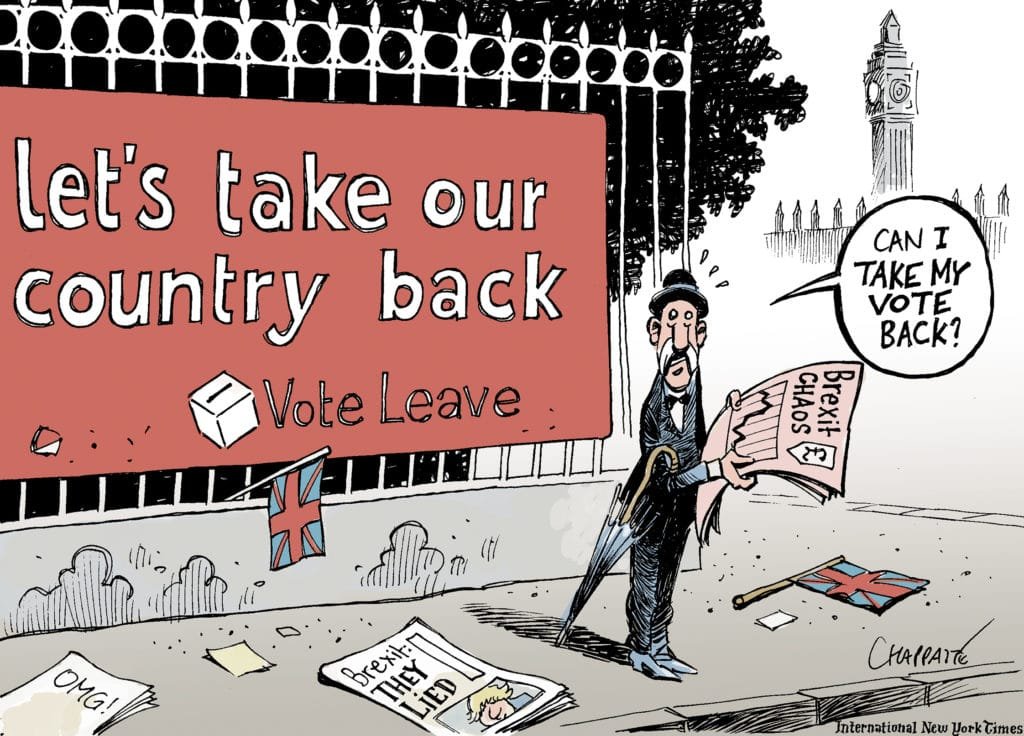Britain’s sovereignty outside of EU was one of the main arguments for Brexit. However, post-Brexit Britain won’t be considerably more sovereign.
Much of the debate surrounding Brexit has concerned the United Kingdom’s sovereignty. For many Leave voters, reclaiming the right to “make our own laws” from a nascent Federal Europe was the overriding justification for Brexit. Legal questions about Parliamentary supremacy entered public consciousness (for probably the first and last time) through the media furore over the Supreme Court case that decided how Article 50 of the Treaty on European Union would be activated. The EU Brexit negotiations are coloured by the UK government’s desire to implement a purported mandate to “take back control”.
This is part of something larger. Perhaps the primary fault line in contemporary politics is that between those reasserting, and trying to reaffirm, the integrity of nation-states, and those pushing towards more globalisation and/or stronger and more integrated supranational institutions. It is at least possible that the “Westphalia system” of sovereign nation-states as the primary political units is experiencing an irreversible decline or mutation.
The ambiguity of sovereignty
Sovereignty, in the broadest sense, is supreme authority within a territory. This is, of course, tightly bound up with the ability to pass (valid) laws. Beyond this, it is quite difficult to say anything much without loading the term. To simply assert that sovereignty has to be vested in a state is arbitrary and ignores the reality of who has in fact held sovereignty historically.
The term first gained traction in the early modern period in the works of thinkers such as Thomas Hobbes and Jean Bodin, and was implicitly or explicitly elaborated to justify the ascendance of the absolute state out of the earlier feudal order. This evolved, through thinkers like John Locke and Baron de Montesquieu, into more liberal conceptions of sovereignty being vested in a constitution or Parliament. Absolutists and liberals, as well as radical democrats like Jean Jacques Rousseau, shared the assumptions that sovereignty is held at a state level but is ultimately derived/derogated from that state’s citizens.
Rather than equating sovereignty with the (historically peculiar) nation-state, though, it is clear that it has always existed (and may have to exist) in any polity and has had varied manifestations. The feudal system, for instance, could be characterised as one where a monarch/state held limited sovereignty balanced against that of their liege lords.
Sovereignty, the UK, and the EU
In the UK it has been held, at least since 1688, that sovereignty resides with Parliament, which may make or unmake any law it pleases. The Supreme Court has recently explicitly reasserted this in Miller v Secretary of State for Exiting the Europe Union. Interestingly, the government’s Brexit White Paper has also recognised that, in principle, Parliament remained sovereign throughout the UK’s EU membership.
This highlights that theoretical/nominal sovereignty is often meaningless. An oft-cited example is that Parliament could ‘legitimately’ ban smoking in Paris. The same is true of passing national laws that contradict EU Law. So long as the 1972 European Communities Act remained in place, EU Law would supersede incompatible national law.
Theoretically, the UK may always have retained the power to unilaterally end this situation by repealing the 1972 Act. In practice, the process for exiting the EU has followed EU Law, with Parliament initiating the procedure by activating Article 50. Bypassing this process was never a realistic option, as it would mean leaving with no possibility of a deal from the EU. Legally, though, it could have been ambiguous territory.
Although the UK would arguably be in violation of Treaty obligations, it would also no longer recognise itself as subject to EU Law. The EU has, and arguably must have, the power to sanction its members for failure to obey its rules for EU Law to have any meaning. Typically, this involves fines and can ultimately include expulsion. Were a state to voluntarily leave there would appear to be no such sanctions under EU Law, even if there could be under international law or in the sense that there would be diplomatic consequences.
“Having the ability to “make our own laws” only has value if one believes that making our own laws is preferable to having them “imposed”
This demonstrates three points about the nature of law in a globalised world: Firstly, the Westphalia model is not, and is probably far from, dead. Ultimate legal authority still largely resides with states. Second, although states are taking on the features of a sovereign, supranational bodies have a limited reach. And third, the realities of interconnection mean that nominal sovereignty does not mean effective autonomy.
Brexit and sovereignty
To my knowledge, nobody wants the UK to reclaim its sovereignty for any reason other than an abstract infatuation with British institutions. Having the ability to “make our own laws” only has value if one believes that making our own laws is preferable to having them “imposed”.
For some, this is an explicitly democratic argument. Parliamentary sovereignty is valuable largely because it is Parliamentary. You can “kick the bums out” and a new Parliament can reverse the mistakes of its predecessors. For others, there is either contextual or absolute value in the English, Welsh, and Northern Irish (though, note, not Scottish) common-law tradition over the continental civil-law system used by the ECJ. For others, the issue is more that either the scale or the multi-national composition of the EU makes it an inappropriate sovereign. And for some “taking back control” is just a proxy for being able to pass specific laws, perhaps relating to immigration, that aren’t possible within the EU.
Without discussing the merits of these arguments, it should be clear that, whilst the concept of sovereignty can be stripped of ideological connotations, its application and purported value cannot.
Is sovereignty ever absolute?
Those who claim that there is something inherently bad about the erosion of national sovereignty insufficiently articulate this. In addition to doing a disservice to anti-globalism, the fetishisation of sovereignty leads to a mischaracterisation of its contemporary and historical reality. For all the talk of Parliamentary supremacy, the judiciary have hinted on occasion that there could be extreme cases (such as Parliament making the “unthinkable” move of abolishing judicial review) where the courts would, indeed, decide there are some laws Parliament cannot make.
Parliament has always chosen to not exercise its theoretical sovereignty over certain areas. It continues to leave certain Royal Prerogative powers in the hands of the executive, allowed EU Law to take precedence for over 40 years, and allows devolution to mean an effective transfer of sovereignty over certain matters to Wales, Northern Ireland, and Scotland. The fact that reversing the latter is ‘only’ politically rather than legally impossible doesn’t stop there being a very real constraint.
Post-Brexit Britain will also continue to see curtailments of sovereignty from international sources, regardless of how hard Brexit is. The UK remains subject to international law, and is unlikely to leave the UN, NATO, or the WTO. It is also actively pursuing trade deals outside of the EU. All of these mean restrictions on, for instance, who the UK declares war against or certain economic and social policies. A major component of contemporary trade deals is regulatory harmonisation, which essentially makes it harder for the UK to regulate and/or deregulate certain areas unilaterally. More abstract features of the international system, such as the increased mobility of capital and people, also limit policy, and therefore legislation, in practice.
“Post-Brexit Britain will also continue to see curtailments of sovereignty from international sources, regardless of how hard Brexit is”
This raises an interesting implication about globalisation. Although international law may be ultimately consensual, it is no less binding. If the actions of government can be constrained by rules made by various non-state institutions, and perhaps even those emerging informally and spontaneously from the conduct of individuals, a loss of state sovereignty need not entail the concurrent development of a sovereign supranational state or global super-state or subordination to a hegemonic power.

Something old, something new
It is impossible to retain absolute effective sovereignty in the context of globalisation. But this is not peculiar to a globalising world. It’s merely the reality of making law in a complex society and in the context of dealing with other polities. Even setting aside the centuries-long transfer of power from the monarch to Parliament in the UK (and the broader pre-Westphalian history of principalities, feudalism, and empires) the notion of an unlimited lawmaker has always been a mirage. Liberals and absolutists alike have, at least since Hobbes, recognised the ultimate need for acquiescence (if not consent) from a state’s subjects for sovereignty, and indeed (at least positive) law itself, to mean anything in practice.
More radical democratic notions of sovereignty as vested in the people have always been tempered by, for instance, the need for this to be derogated to, well, a Parliament. Indeed, short of arguing for a totalitarian infused Rousseauian notion of a general will, ‘democratic’ sovereignty must be shorthand for a compromise between different individuals and/or groups. Simply pointing to ‘the people’ as either the true or ideal sovereign essentially says nothing at all.
This is not to say that the delineation of sovereignty is arbitrary, neither the unavoidability of referring to background political values nor the need to recognise the inherent limits to law-making make considerations about sovereignty an irrelevance. Regardless of globalisation, I would, for instance, argue that sovereignty should exist in a form that is complementary to a pluralist liberal polity and the rule of law.
Likewise, globalisation need not mean the end of the nation-state retaining significant sovereignty. There is certainly room for an articulate defence of a nationalist and/or democratic vision of exactly what areas a particular state retains sovereignty over. It is just that this cannot entail a confusion of sovereignty with omnipotence, or the delusion that a pristine mythical Westphalia state can be reborn and roll back the internal and external obligations and consequences it inevitably faces.







Article Discussion